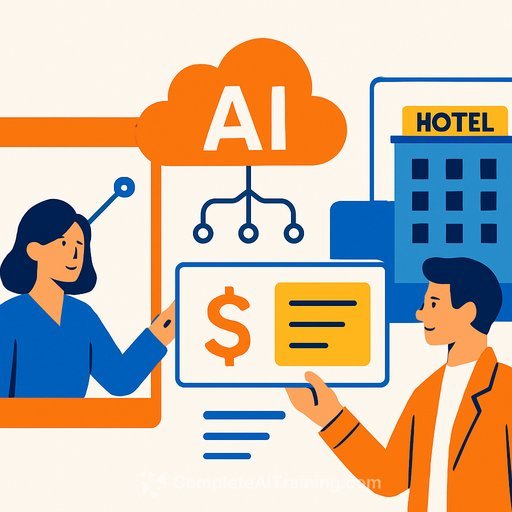The Complete Guide to Using AI in the Hospitality Industry in United Arab Emirates in 2025
Too Long; Didn't Read:
In 2025, AI adoption in UAE hospitality is mainstream. Around 60% of travellers use AI algorithms for trip planning and bookings. Chatbots handle roughly 80% of routine inquiries, boosting direct bookings by 15–30% and reducing costs by up to 50%. Operators must focus on compliance with the Personal Data Protection Law (PDPL), vendor management, and align with national AI goals targeting AED 335 billion added value by 2031.
The UAE hospitality sector now leverages AI to provide seamless, personalised guest experiences — from 24/7 multilingual concierge chatbots to automated fraud detection and predictive maintenance. These technologies free staff to focus on the human interactions guests still value, especially in luxury settings. Industry reports confirm AI’s role in driving efficiency and guest satisfaction while maintaining trust.
For professionals seeking to build AI skills relevant to hospitality, AI Essentials for Work offers a practical 15-week program covering foundations, prompt writing, and job-focused AI applications.
Program Details: AI Essentials for Work
- Length: 15 weeks
- Courses: Foundations, Writing AI Prompts, Practical AI Skills
- Cost: $3,582 early bird; $3,942 regular
- View syllabus and register
“Human connection remains at the core of hospitality. Innovation should amplify those moments, not replace them. The goal is to free staff so they can engage in meaningful interactions.” — Amy Read, VP Innovation at Sabre Hospitality
1. What Are the New Rules for the United Arab Emirates in 2025?
UAE’s Personal Data Protection Law (PDPL) now governs how hospitality businesses handle guest data, including booking details, biometric info, and health records. Operators must establish lawful bases for data processing—often explicit consent—and conduct Data Protection Impact Assessments (DPIAs) for high-risk AI deployments.
The UAE Data Office will soon publish Executive Regulations detailing operational standards. Meanwhile, prompt breach reporting to regulators and affected individuals is mandatory. Free-zone jurisdictions like DIFC and ADGM maintain GDPR-style rules, with the DIFC recently strengthening fines and legal risks, making updated contracts and data governance critical before peak seasons.
2. What Is the AI Conference in UAE 2025?
The UAE hosts several AI-focused events that bring together hoteliers, tech vendors, and regulators to share practical AI applications:
- World AI Technology Expo 2025 (May 14–15, Dubai): Global AI vendors showcase hospitality-specific solutions.
- 9th Hospitality & Travel Technology Innovation Summit (April 8–9, Dubai): Invitation-only event for industry leaders.
- The Hotel Show 2025 (May, Dubai World Trade Centre): Demos of hospitality tech, F&B, and wellness innovations.
These events focus on hands-on demos like AI chatbots, wellness tech, and automation pilots, enabling hotels to fast-track AI adoption ahead of peak seasons.
3. How Is AI Used in the United Arab Emirates Hospitality Sector?
AI applications are integrated across guest touchpoints:
- Chatbots & Virtual Assistants: Handle up to 80% of routine queries, support 24/7 multilingual service, and lift direct bookings by 15–30%.
- Smart Check-in & Biometrics: Over 70% of hotels offer digital check-in and keyless entry.
- Robotics & Automation: Delivery robots operate in luxury hotels, enhancing service efficiency.
- Predictive Analytics & Revenue Management: AI-driven pricing improves revenue per available room (RevPAR) and occupancy.
- Multilingual Support: Essential in a market with 200+ nationalities, supporting Arabic and many other languages.
These technologies allow staff to focus on high-touch guest interactions while automating routine tasks.
4. Priority Use Cases and Quick Wins for UAE Hotels
To achieve fast returns, hotels should start with these AI pilots:
- AI Chatbot/Digital Concierge: Integrate with WhatsApp and PMS/CRM systems, use room-level QR codes for instant guest recognition. Target 70–80% automation and boost direct bookings.
- Guest Feedback Sentiment Analysis: Automate review triage to identify urgent issues and improve ratings through quick recovery actions.
- Dynamic Pricing: Run short trials around events to increase RevPAR with AI-driven pricing models.
- Predictive Maintenance: Use sensors and analytics to reduce downtime and repair costs on high-value equipment.
These pilots align with UAE’s multilingual, mobile-first, and smart-city environment and can scale as results prove out.
5. Compliance Checklist for Hospitality Operators in the United Arab Emirates
Key compliance steps include:
- Map all guest data flows and maintain a Record of Processing Activities.
- Secure lawful bases for processing, with explicit consent for sensitive or profiling activities.
- Conduct DPIAs for AI and profiling projects.
- Appoint or designate a Data Protection Officer (DPO) for high-risk operations.
- Implement breach response plans with prompt notification to regulators and guests.
- Update vendor contracts with PDPL-compliant Data Processing Agreements (DPAs) and cross-border safeguards.
- Apply technical controls: encryption, role-based access, multi-factor authentication, and logging.
- Provide role-based PDPL training, perform regular audits, and handle data subject access requests efficiently.
6. Procurement, Vendor Management and Legal Clauses for UAE Deployments
Vendor contracts must enforce compliance and operational security:
- Specify data residency and approved UAE cloud regions to ensure local processing and lower latency.
- Include cross-border transfer safeguards like Standard Contractual Clauses or Binding Corporate Rules.
- Conduct financial and operational due diligence, including AML/KYC and Ultimate Beneficial Owner verification.
- Set security SLAs covering encryption, access control, logging, and breach notification timelines aligned with PDPL.
- Embed audit rights, continuous monitoring, and termination clauses to manage risks quickly.
7. Implementation Roadmap and KPIs for United Arab Emirates Hotels
A practical rollout plan includes:
- Establish governance aligned with PDPL and UAE National AI Strategy 2031.
- Baseline data readiness and launch pilots—such as AI concierge chatbots integrated with PMS and dynamic pricing experiments.
- Instrument systems for ongoing monitoring and train staff on AI-augmented workflows.
- Strengthen vendor contracts, conduct DPIAs, and formalise breach response playbooks.
- Scale successful pilots with zero-trust controls and regular audits.
Track KPIs like guest experience (NPS, response times), commercial impact (direct booking lift, RevPAR), operational resilience (downtime reduction), compliance metrics (DPIAs completed, breach notification times), and staff AI training completion.
8. Risk Management: Privacy, Bias, Competition and Reputational Risks in the United Arab Emirates
Managing AI risks requires a balanced approach:
- Privacy & Regulatory: Perform DPIAs, obtain explicit consent, and design AI with privacy in mind.
- Cybersecurity: Train staff to spot phishing, use AI-assisted threat detection, secure cloud and IoT systems, and maintain incident response plans.
- Bias & Reputational: Document AI models, provide explainability to guests, and maintain governance with C-suite oversight.
“Integrating cybersecurity into all business functions and establishing a solid AI framework are key to enhancing security and innovation. Collaboration among business leaders, regulators, and peers builds resilient regulations that protect economies and individuals while supporting technological progress.” — Samer Omar, Cybersecurity and Digital Trust Leader, PwC Middle East
9. What Is the Future of AI in the Hospitality Industry in the United Arab Emirates?
Looking ahead, UAE hospitality will scale AI with faster, smarter services backed by national investments. Hotels will pilot real-time dynamic pricing, agentic assistants, and hyper-personalised guest experiences, enabled by infrastructure supporting low-latency processing.
With the UAE AI Strategy 2031 targeting AI to contribute ~45% of GDP and add AED 335 billion, operators that combine short, measurable pilots with staff training will succeed. AI Essentials for Work courses offer practical skills in prompt engineering and AI tooling to help teams convert pilots into steady revenue streams and compliant deployments.
“The new strategic planning cycle for the Federal Government prioritises artificial intelligence in process optimisation and financial efficiency.” — Sheikh Mohammed bin Rashid Al Maktoum
10. Frequently Asked Questions
What are the new UAE rules for AI and guest data use in hospitality in 2025?
PDPL governs guest data including bookings, biometrics, and health info. Operators must document lawful bases, often requiring explicit consent, conduct DPIAs for AI, designate DPOs for high-risk projects, and apply technical safeguards like encryption and multi-factor authentication. Breach reporting is mandatory and free-zone jurisdictions have strict GDPR-style rules with heightened penalties.
How is AI being used in UAE hotels and what performance metrics have operators seen?
AI powers multilingual chatbots, smart check-in, robotics, dynamic pricing, IoT, and predictive maintenance. About 60% of travellers rely on AI for trip planning. Chatbots handle 70–80% of routine queries and increase direct bookings by 15–30%. Over 70% of hotels use digital check-in. Benefits include faster responses, higher revenue per room, and lower downtime.
What are priority use cases and quick wins UAE hotels should pilot first?
Start with AI chatbots integrated with PMS and WhatsApp, plus room QR codes to identify guests. Aim for 70–80% query automation and direct booking increases. Add guest feedback sentiment analysis to improve service recovery, and pilot dynamic pricing and predictive maintenance for operational gains.
Your membership also unlocks:





